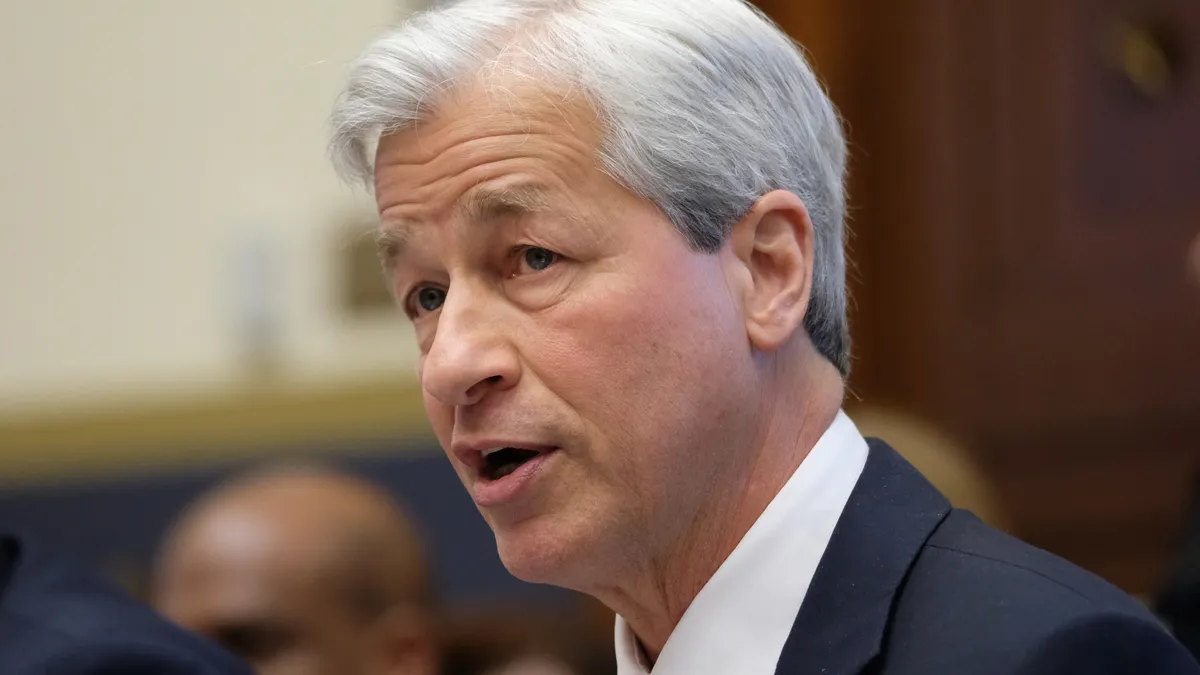Lawmakers took aim at JPMorgan Chase CEO Jamie Dimon in a letter Tuesday over an alleged “about-face” on his firm’s climate and environmental commitments.
The nation’s largest bank made a number of “binding commitments” on climate and environmental issues over the past two decades — first by joining the Equator Principles, a risk management framework financial institutions adopt to assess environmental and social risk of projects, in 2006, and then by committing to the goals of the 2015 Paris Agreement and the Climate Action 100+, six senators wrote.
But in his letter to shareholders April 8, Dimon said JPMorgan would use the word “commitments” more reservedly going forward, drawing a line between “aspirations we are actively striving toward and binding commitments.”
JPMorgan exited both the Equator Principles and the Climate Action 100+, and Dimon called on “proper government action … [that is] not there yet” to address climate issues.
“Surprisingly, as the CEO of the nation’s largest bank, you appear to have lost your faith in the private sector’s ability to solve problems,” wrote Sens. Elizabeth Warren, D-MA; Sheldon Whitehouse, D-RI; Ed Markey, D-MA; Jeff Merkley, D-OR; Bernie Sanders, I-VT; and Peter Welch, D-VT.
JPMorgan, the lawmakers noted, was the top financier to fossil fuel companies last year, according to a report funded by nonprofits including the Sierra Club and Rainforest Action Network. The bank lent or underwrote more than $40.9 billion to fossil fuel companies in 2023, they said.
The bank, lawmakers noted, also recently changed its emissions reduction target for oil and gas end use to a new “energy mix” target, which “makes it impossible for an investor to know if JPM is doing anything at all to reduce its oil and gas financing because it represents a combination of your financing to the oil, gas, and clean energy industries.”
“Your recent statements and actions indicate a retreat by JPM from the firm’s earlier pledges to help mitigate climate change. This is disappointing, raising questions about the impact of these policy changes moving forward, and about whether JPM misled investors and the public when you made these commitments,” the senators wrote. “You owe Congress and the public answers.”
The group is asking the CEO exactly what he means by both “aspirations” and “binding commitments;” for details on how his firm exited the Equator Principles and Climate Action 100+; and also information on how it landed on its new “energy mix” target.
In his letter to shareholders in April, Dimon provided some context on JPMorgan’s exit from the Equator Principles and Climate Action 100+.
“JPMorgan Chase recently exited Climate Action 100+ and the Equator Principles. ‘Why?’ we are asked. While we don’t necessarily disagree with some of the principles many organizations have, we make our own business decisions,” Dimon wrote. “We think we have some of the best-in-class environmental, social and risk standards because we have invested in our own in-house experts and matured our own risk management processes over the years. As a result, we are going to go our own way and make our own independent decisions, gathering the best learnings of experts in the field, and, of course, we will follow all legal requirements.”
The firm has “organized a special group around the green economy and related infrastructure investment” to help play a role in tackling climate issues, Dimon noted in his letter, and the group of hundreds of employees will “inform our work across all established industry groups (from auto to real estate, energy, agriculture and others).”
The senators want answers to their questions by July 24.
"The recent backsliding on climate commitments, not only from JPMorgan Chase but from other Wall Street banks as well, underlines the need for regulators to take urgent action,” said Ernesto Archila, climate and financial regulation policy director for progressive think tank Public Citizen, in a statement shared by the senators. “Banks should be compelled to take a serious look at their financed emissions, and make effective and transparent plans to address the financial risks associated with climate change."
A JPMorgan spokesperson declined to comment on the letter.














